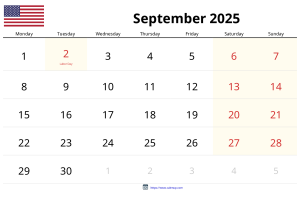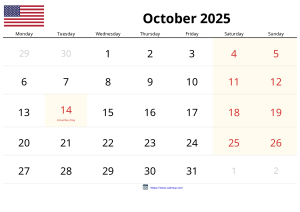The Andorra Calendar 2025 is an essential tool for those who wish to understand and experience the traditions of this small country located in the Pyrenees. The festivities and holidays not only reflect the rich Andorran culture but also provide a unique opportunity for visitors and residents to connect with their roots. This calendar is indispensable for planning trips, events, and celebrations, ensuring that no one misses the most significant occasions.
Furthermore, knowledge of the festive dates is crucial to fully enjoy the local celebrations. Participating in these festivities not only enriches the cultural experience but also strengthens community bonds and promotes the appreciation of traditions. By using the calendar in PDF or Excel format, you can organize your schedule in a practical and efficient manner, making the most of every special moment in Andorra.
National Holiday Calendar in Andorra
Andorra, a small principality located in the Pyrenees, has a rich tradition of celebrations that reflect its culture and history. The national holiday calendar in Andorra is an important aspect of life for both residents and visitors. The holidays, which are generally days of rest, include religious celebrations and significant civic events. The main national holidays are: Our Lady of Meritxell Day, celebrated on September 8, and Independence Day, on March 14. During these days, Andorrans gather to participate in festivities, masses, and cultural events.
In addition to the holidays, Andorra also observes some movable dates that may vary each year, depending on the liturgical calendar. For example, Easter and All Saints' Day are moments of great importance, where the population participates in religious rituals and family activities. During Easter, it is common to see celebrations that include processions and community events that attract both locals and tourists.
National holidays not only provide a time for rest but are also opportunities for Andorrans to celebrate their cultural identity. The festivities often include folk dances, craft fairs, and musical performances. This connection between the past and the present is vital for the preservation of Andorran culture, and many visitors take advantage of these dates to experience local authenticity.
Regional Holidays and their Celebrations
In addition to national holidays, Andorra has a series of regional holidays that vary according to the parishes. Each parish may celebrate specific dates in honor of their patron saints, promoting festivals that attract locals and visitors. For example, the parish of Encamp celebrates Saint Peter's Day on June 29, while La Massana celebrates Saint Bartholomew's Day on August 24. These regional celebrations are moments of great unity and joy among the community.

The celebration of regional holidays often involves a variety of activities, including masses, parades, and food fairs. During these festivities, residents have the opportunity to showcase their local culture, such as traditional dances and typical foods. The festive atmosphere is enriched by stalls selling crafts and local products, creating a vibrant experience for all attendees.
The importance of regional holidays goes beyond festivity; they are also times to strengthen community ties and preserve traditions. The parishes organize these events with the active participation of residents, ensuring that younger generations learn about their roots and traditions. For tourists, these celebrations offer an authentic glimpse into Andorran life, away from traditional tourist spots.
Commemorative Dates and Local Traditions
Andorra is rich in commemorative dates that reflect its history and local traditions. One of the most significant dates is the Day of Our Lady of Meritxell, the patroness of Andorra, which is celebrated with great fervor in September. In addition to solemn masses, there are processions and cultural events that attract thousands of people. It is an opportunity for the Andorrans to express their devotion and strengthen their cultural identity.
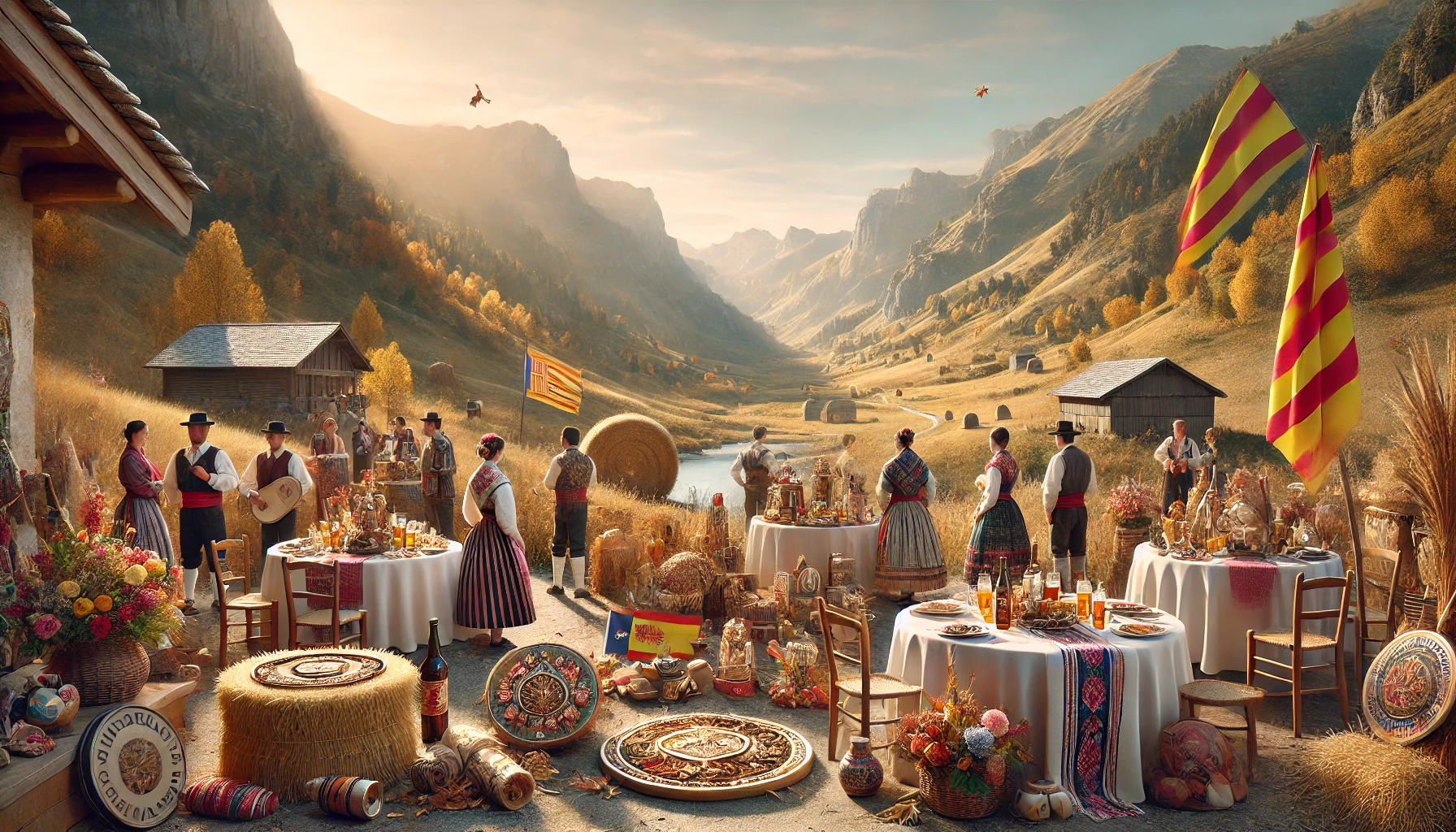
Another important date is the Feast of Saint John, celebrated on June 24, which marks the summer solstice. On this day, it is common for communities to light bonfires in celebrations that symbolize the arrival of summer. People gather in groups to share typical foods and drinks while dancing around the bonfires, creating a festive and joyful atmosphere.
Local traditions in Andorra also include seasonal festivals, such as the Snow Festival, which takes place in the winter. During this event, the mountains become the stage for winter sports competitions, cultural performances, and winter fairs. These commemorative dates not only celebrate Andorran culture but also attract tourists seeking authentic and immersive experiences.
Religious Events and their Meanings
Religious events in Andorra are deeply rooted in the local culture, reflecting the devotion of the population. The Holy Week is one of the most significant periods, where communities carry out various religious activities, including processions and masses. During these days, the city transforms, and residents engage in the celebrations, reflecting on the importance of the date and its traditions.
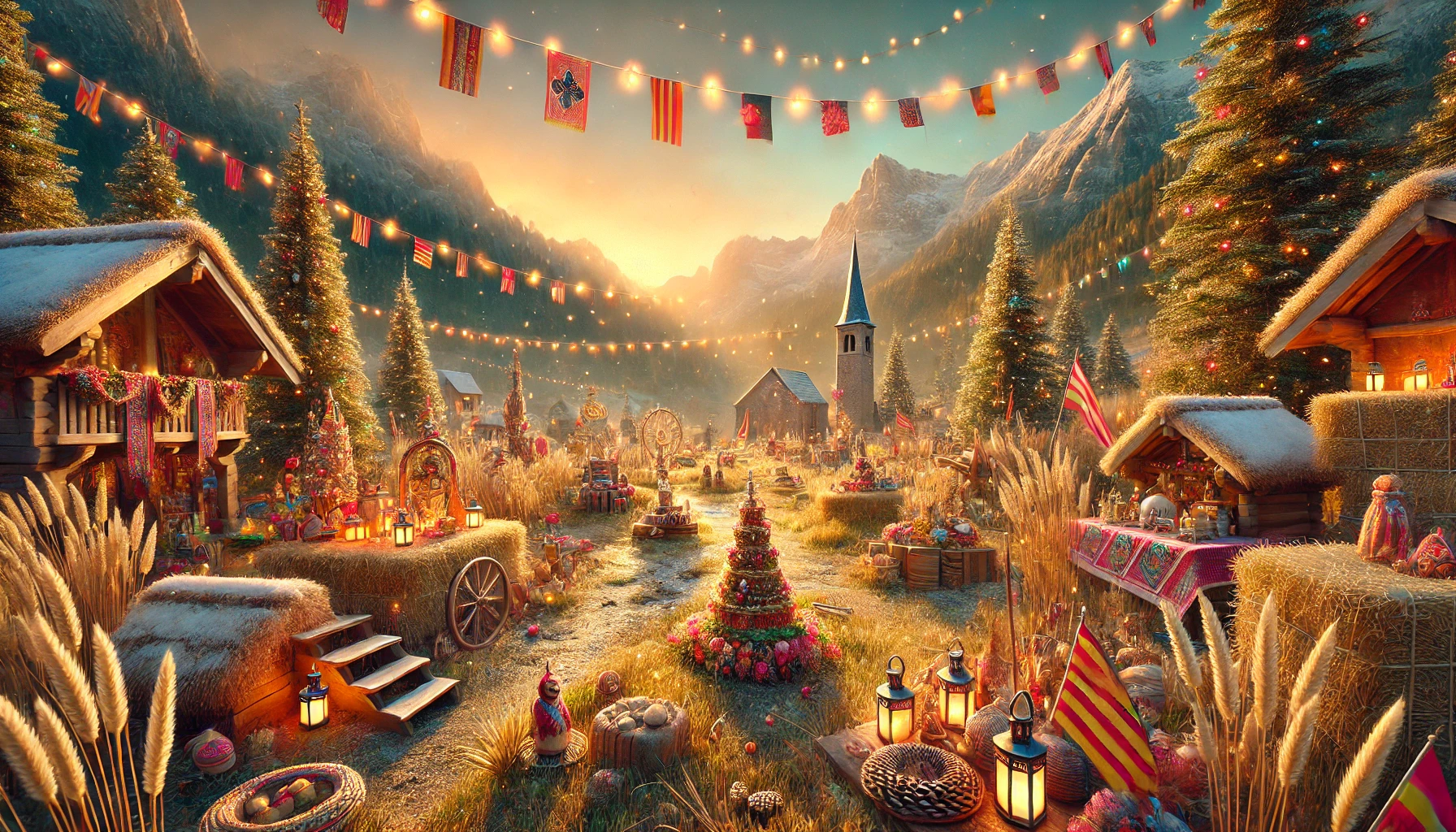
Another notable religious event is All Saints' Day, celebrated on November 1. On this day, Andorrans visit cemeteries to honor their loved ones. It is a moment of reflection and remembrance, where families gather to remember those who have passed away. Churches organize special masses, and an atmosphere of respect and reverence permeates the surroundings.
Additionally, some parishes hold festivals in honor of local saints, such as the feast of Saint Julian, which includes masses, dances, and typical foods. These events not only strengthen the community's faith but also provide an opportunity for people to come together and celebrate their traditions. Religious events are, therefore, a vital aspect of Andorran culture, promoting social cohesion and the preservation of local identity.
Commercial Calendar: Promotions and Fairs in Andorra
The commercial calendar in Andorra is marked by various promotions and fairs that attract both residents and tourists. Throughout the year, the city hosts shopping events, such as the Commerce Week, which usually takes place in November. During this period, stores offer significant discounts, creating an unmissable opportunity for those looking to take advantage of good deals.
In addition to year-end promotions, Andorra is also famous for its craft and food fairs. The Christmas Fair is a perfect example, where local artisans showcase their products and typical delicacies. This event not only stimulates the local economy but also provides a rich cultural experience, where visitors can learn about Andorran craftsmanship.
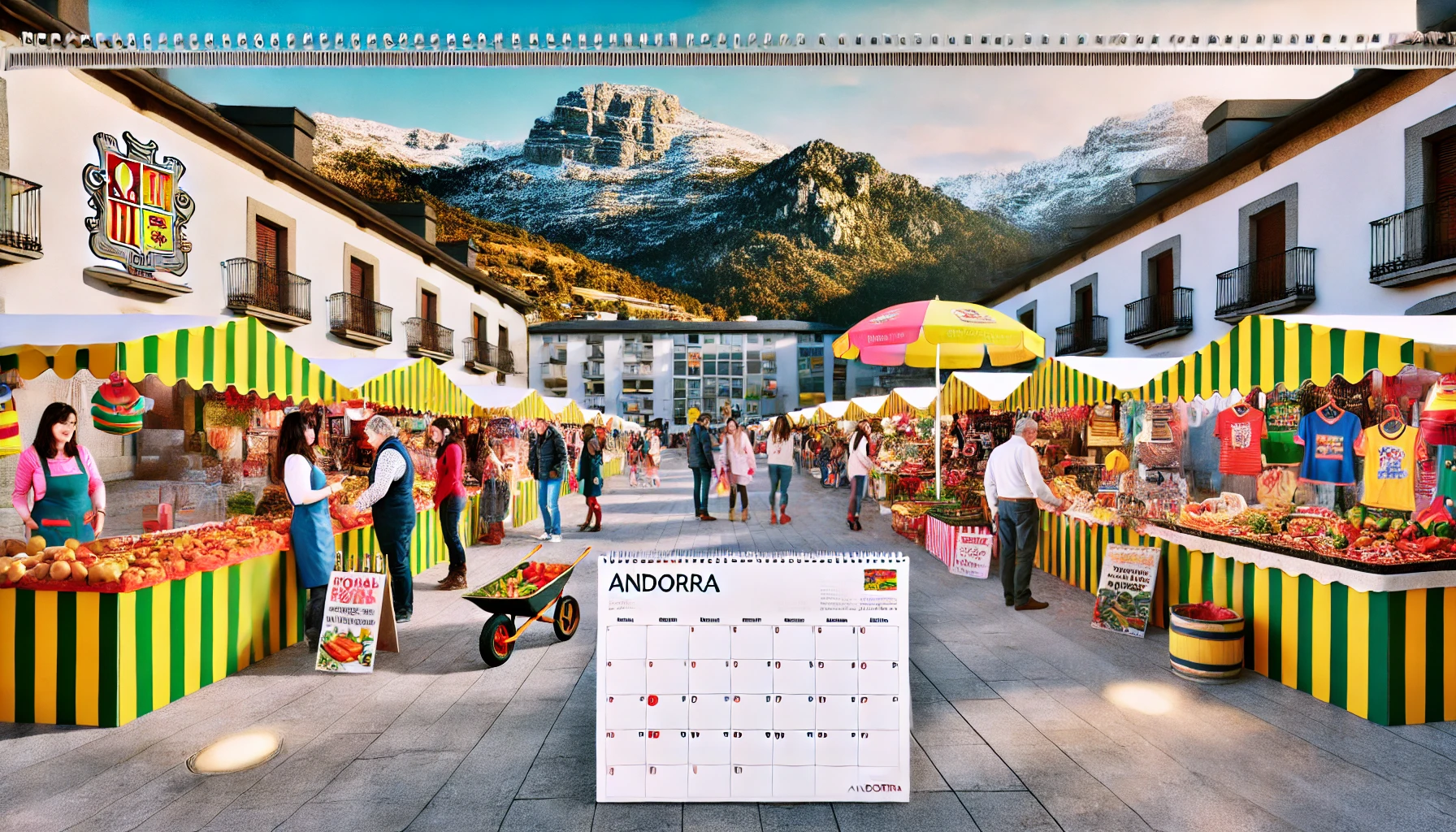
The commercial calendar also features seasonal festivals that celebrate local culture, such as the Summer Festival, which includes live music, dances, and food stalls. These events are essential for promoting Andorran culture and fostering local commerce, providing a unique and engaging experience for all visitors.
Timetables of Main Cities in Andorra
The main cities of Andorra, such as Andorra la Vella and Escaldes-Engordany, follow Central European Time (CET), which is one hour ahead of Coordinated Universal Time (UTC+1). During daylight saving time, which runs from March to October, the time zone changes to UTC+2. This means that when planning a visit or event, it is essential to be aware of the time differences to avoid confusion.
The operating hours of shops, restaurants, and tourist attractions often vary, especially during holidays and special dates. In general, establishments in the capital tend to open between 9 AM and 8 PM, but hours may be reduced during holidays. It is advisable to check the specific hours of each location to ensure a smooth experience during your visit.
Additionally, the time differences between Andorra and other European countries can impact communications and travel planning. For example, while France and Spain also follow Central European Time, other countries, such as the United Kingdom (UTC+0), have a different time zone. Therefore, it is important to pay attention to these variables when organizing your trip.
Time Zone Comparison between Andorra and Other Countries
Understanding the time differences between Andorra and other countries is essential for those planning to travel or communicate with friends and family. As mentioned earlier, Andorra follows Central European Time (UTC+1), which adjusts to UTC+2 during daylight saving time. Compared to other European countries like Spain and Italy, Andorra is in the same time zone, making it easier to coordinate travel and meetings.
However, when comparing Andorra with countries outside Europe, the time differences become more pronounced. For example, New York (UTC-5) is six hours behind Andorra during standard time and five hours during daylight saving time. Therefore, someone in New York who wants to connect with friends in Andorra should consider these differences when scheduling calls or meetings.
These variations are also relevant for businesses engaged in international trade. Knowing the operating hours and time zone differences can help optimize communication and scheduling of meetings. In an increasingly globalized world, being aware of time differences is a crucial aspect of maintaining healthy business and personal relationships.
Curiosities about Andorra: Unusual Holidays and Celebrations
Andorra is a small country, but full of curiosities related to its holidays and celebrations. One of the most unusual traditions is the celebration of the Saint John's Fire Festival, where bonfires are lit in several parishes. This event, which takes place on the night of June 23, symbolizes purification and protection against evil. People gather around the bonfires to celebrate with music and dances, creating a festive and welcoming atmosphere.
Another interesting curiosity is the celebration of Wealth Day, which occurs on September 8, in sync with the Day of Our Lady of Meritxell. During this day, the population engages in charity and donation activities, reflecting on the importance of sharing and helping those in need. It is an opportunity for the community to come together for a greater good, reinforcing social and spiritual bonds.
In addition, Andorra has a tradition of winter festivals, such as the International Music Festival of Andorra, which brings together artists from various musical genres. This event attracts both musicians and music lovers, promoting local culture and artistic diversity. These festivities not only celebrate Andorran cultural identity but also attract tourism, contributing to the local economy and promoting Andorra as a vibrant tourist destination.
Closing
The Andorra Calendar is an essential tool for those who wish to keep track of the festivities and holidays in this small European country. Understanding the commemorative dates and local celebrations is fundamental for tourists and residents, as it enriches the cultural experience. Moreover, having access to this calendar in formats such as PDF or Excel makes it easier to plan and organize personal and professional events.
The celebrations in Andorra are not just dates on the calendar, but moments that reflect the identity and tradition of the Andorran people. This commemorative event not only promotes social unity but also values the history and customs that shaped the nation. Therefore, knowing these dates is an important step towards a better understanding of the local culture and fully experiencing the offerings of the country.
Finally, taking advantage of the Andorra Holidays and Celebrations Calendar - PDF or Excel is an effective strategy for planning visits and actively participating in events. With this, it is possible to experience the traditions and festivities in a more meaningful way. Thus, access to this information not only enriches your journey but also promotes a greater connection with Andorran culture.


